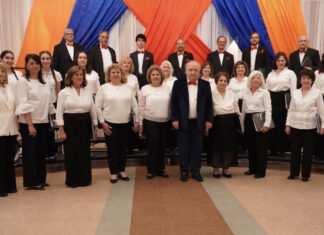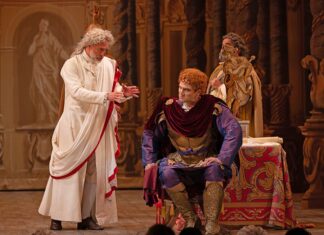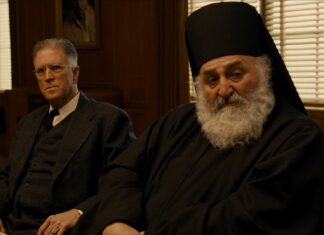ISTANBUL/YEREVAN — Peter Balakian was part of a US State Department-sponsored literary tour in Istanbul and Yerevan from October 17 to 23 that included five American writers who were part of the University of Iowa International Writers Program (IWP). Christopher Merrill, poet and nonfiction writer and director of the Program, led the group that included Balakian, novelists Maureen Freely and Gish Jen, and poet Mary Hickman.
The tour involved readings at Bogazici University and the Beyoglu Art Gallery in Istanbul, and American University of Armenia and Yerevan State University in Yerevan, as well as teaching creative-writing workshops and meeting with students at the universities.
On Saturday evening at the Beyoglu Municipality Art Gallery on Istiklal Street, Balakian, Jen, and Freely read with young Turkish fiction writers Tugba Doga, Yalcin Tosun and Melida Tuzunoglu. Freely and Jen read fiction and Balakian read poetry, and nonfiction from the chapter “Istanbul was Constantinople” in Black Dog of Fate. In reflecting on the complex history of Istanbul through the lens of Armenian memory and his family history, Balakian gave the audience a brief portrait of the Balakian and Panosyan familiy pasts in Istanbul before the Armenian genocide and discussed the historical Armenian presence in the city and the complexity of identity that has ensued. Following the reading there was an affirmative question and conversation period with an engaged Turkish audience.
The next day, the US Consulate’s Public Affairs Officer Craig Dicker hosted a party at which Turkish writers, US foreign service officers, and American writers, academics, and journalists socialized into the evening.
On October 20, the group flew (via Vienna because of the blockaded Turkish-Armenian border) to Yerevan where the writers met with Armenian university students at the American Corner — a library sponsored by the US embassy, then went to AUA to read their work. The tour, which was part of a program of literary cultural exchange that Merrill organizes and directs each year with the US State Department, was aimed in part at fostering dialogue between Armenians and Turks as the 100th anniversary of the Armenian genocide approaches. Balakian’s presence as a literary bridge between the two cultures was important, especially in Turkey, and program director and poet Christopher Merrill noted: “It was deeply moving for me to visit Armenia on the eve of the 100th anniversary of the genocide — the tragedy that created the template for so much of the barbarism of the modern world, some of which I have tried to chart in my writings. And it was no less moving to spend time in the monastery of Geghard, where a monk sang for us a hymn in his rich tenor, the sacred words impressing themselves in the stone. To hold in my mind this ancient religious tradition and the complicated political reality of this moment in history made clear the necessity of turning the commemoration of horror into a renewed commitment to hold the Turkish government to account not only for the evil committed in 1915 but for a history of attempts to evade responsibility for the crimes committed in the last days of the Ottoman Empire.








